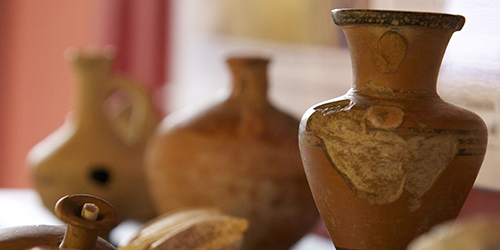Classical Studies
Study Greek and Roman culture through art, myth and literature, and explore the history of its reception and its relevance today.
Study abroad
In the second year you have the chance to spend an unforgettable term studying in Canada, Australia or the US.
Passionate community
The Classics and Ancient History Society brings together like-minded students with a packed calendar of social and academic events, including an annual play.
Esteemed department
Bristol is ranked 15th in the UK for the study of Classics and Ancient History (QS World University Rankings by subject 2024).
Classical Studies courses for 2025
Single Honours
Joint Honours
Classical Studies at Bristol
As a Classical studies student, you will have the opportunity to explore with us the literature, art, mythology and philosophy of the classical world as well as the legacy that ancient cultures have left to writers, thinkers and artists in later centuries right across the world.
The Department of Classics and Ancient History is internationally renowned for its innovative research on antiquity and the broad range of our expertise, from literary analysis and classical reception to the history of art and performance is all reflected in your degree programme.
You'll study in our recently renovated Humanities Hub, home to new lecture theatres, flexible teaching spaces, a screening room, an exhibition area and a range of social spaces. You will also learn through field trips to local Roman sites and using resources such as our extensive collection of ancient coins.
You might also be interested in Classics or Ancient History.
My degree and studies have helped me to develop critical thinking and the ability to research and present ideas in essay form. I have had opportunities to express thoughts and debates in tutorials with peers.
Career prospects

The breadth of material studied in a classical studies degree will help you to develop critical thinking and clear self-expression, skills that are transferable to a wide range of careers.
Our graduates are highly employable and have found positions in research, administration, media, museums, art galleries, heritage management, the civil service, law, accountancy, computing and teaching.
Many graduates go on to postgraduate study in classical studies or other humanities subjects.
Course structure

You will focus on Greek and Roman culture: the art, myth and literature of the classical world, the history of its reception, and its continuing relevance. You will also have the opportunity to explore the legacy of Graeco-Roman culture in the works of later thinkers and artists across different media, including literature, theatre and film. You may also choose to learn an ancient language.
You will take four core units and two optional units for each of your first two years, allowing you to pursue your own interests in classics and beyond. One of the optional units may be taken elsewhere in the University in a subject you're interested in.
There is the possibility of studying abroad for one semester in the second year. For more information visit the Centre for Study Abroad.
Your third year will include a larger research project on a topic of your choosing. You will also plan, promote and execute a project aimed at presenting the ancient world to the wider public.
Interdisciplinary community

The department's research is brought together by the Institute of Greece, Rome, and the Classical Tradition. It hosts distinguished scholars to give seminars and lectures, holds symposia and conferences, and cultivates international links with other scholars and organisations.
The institute embraces research from many fields, including history of all kinds, archaeology, literary studies, art history and philosophy, and has a particular focus on research that explores the links between ancient and modern.
Professor Mary Beard, who was awarded an honorary degree by the University in 2012, is a vice-president of the institute.
